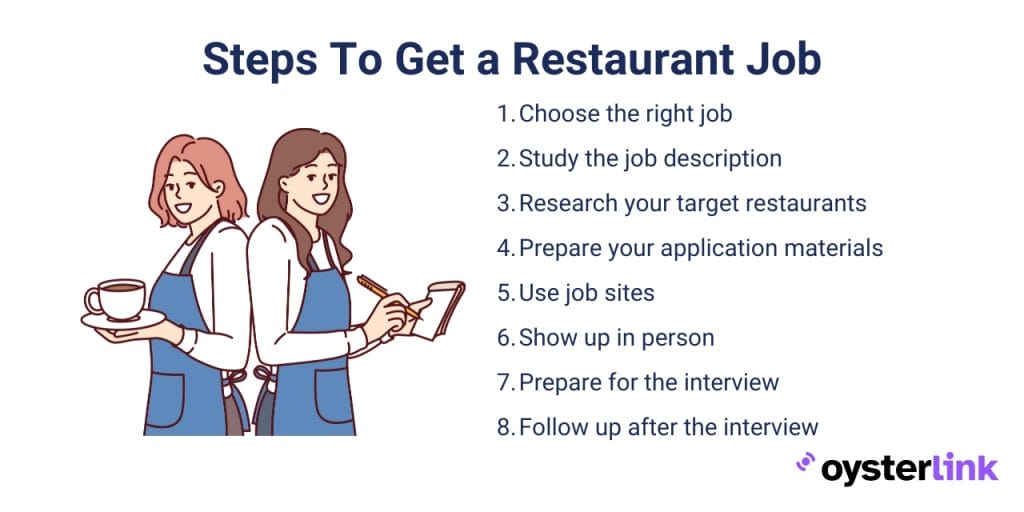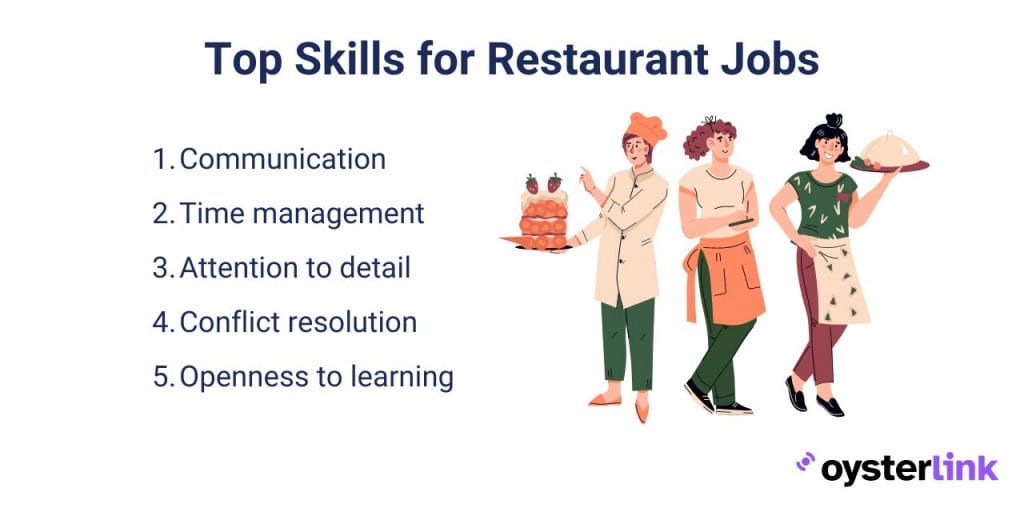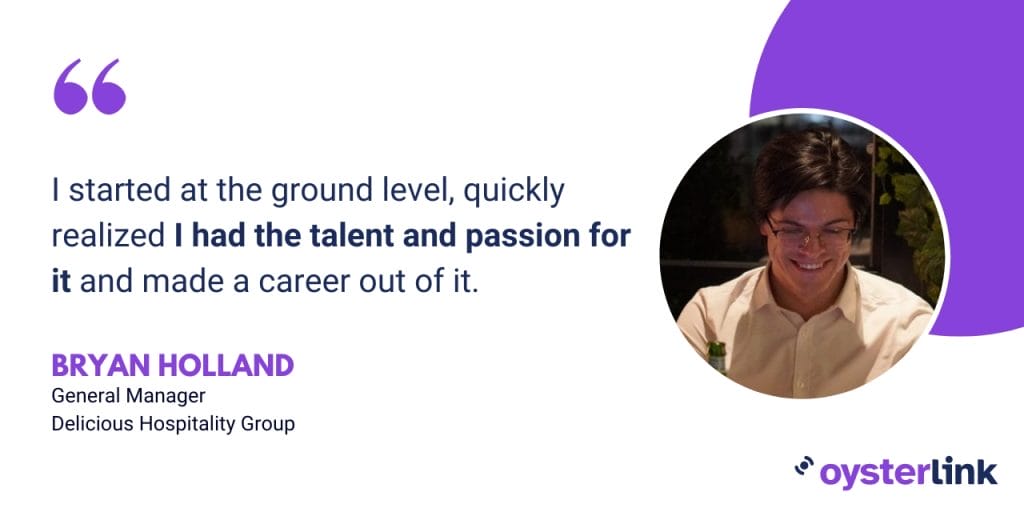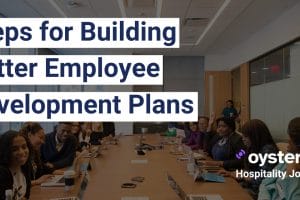Whether you’re looking for a part-time job or starting a career in the food service industry, we’ve put together this guide to help you increase your chances of finding and landing a job at a restaurant.
Many restaurants offer different kinds of positions (from entry-level to supervisory and managerial ones) with their respective wages. If you’re aiming to earn a higher salary, then several years of experience in the industry is what you need.
You can start building that experience quickly by applying for your first job now, learning about essential skills for working in a restaurant and more. Read on for steps on how to get a job at a restaurant, the top skills you need to succeed, a list of entry-level positions and the pros and cons of restaurant work.
10 Steps To Get a Job at a Restaurant
Restaurant work equips you with the skills you need to thrive in any position, such as discipline, time management, people skills and communication. If you’re set on finding your first job or a new job in a restaurant, below are some steps you can take to make this happen.

1. Choose the Right Job
If you have little or no work experience, consider applying for entry-level positions. Roles such as Busser, Barback, Dishwasher or Server are typically more accessible.
Keep in mind that there are front-of-house and back-of-house jobs in the restaurant business. You can choose which kind of job aligns with your skills and interests. Below are examples of front-of-house and back-of-house jobs.
| Job Type | Description | Examples |
| Front-of-house | Focuses on customer service, greeting guests, taking orders and ensuring a positive dining experience | Server Host/Hostess Bartender |
| Back-of-house | Responsible for food preparation, cooking and maintaining kitchen operations | Line Cook Dishwasher Chef Prep Cook |
As you’re just starting your restaurant career, it may be a good idea to consider applying for multiple entry-level roles as long as they align with what you want to do and learn. You can find out whether a certain role is considered entry-level when you read the respective job description.
2. Study the Job Description
After choosing the jobs you’d like to apply for, read the job descriptions to learn about each position’s relevant responsibilities and required skills.
Here is a sample Dishwasher job description similar to what you would often see in job ads. You can even download it to serve as reference material.
From this job description, you get an idea of what you should expect in terms of responsibilities and how good of a fit you are for the role. Also, if the job description says that previous experience is only preferred and not required, then this makes it an entry-level role.
Keep in mind that any transferable skills you may have, such as multitasking, customer service experience or discipline — be it from school or from other jobs — can be used in your first restaurant job.
3. Understanding Different Restaurant Roles
Before applying, familiarize yourself with the various positions within a restaurant. Understanding roles such as Line Cook, Sous Chef, Server, Host or Bartender can help you identify where your skills best fit.
Then, explore various career tools and resources to research job titles, responsibilities, and the skills required. This understanding will help you target your applications effectively and prepare confidently for interviews.
4. Research Your Target Restaurants
Look up restaurants hiring for your desired role. You can choose restaurants near where you live or those you can easily commute to or drive to.
You can also look for restaurants willing to hire candidates with little to no experience. They usually mention this in the job description, on their website or on posters or placards at the restaurant itself. These restaurants usually have a solid training program to equip their staff with the right knowledge to do their jobs.
Additionally, there might be particular types of restaurants that you would most prefer to work at. Below are different types of restaurants with examples so you know what kind of restaurant you’re applying for.
| Type of Restaurant | Description | Popular Examples |
| Fast-food chains | Offer quick, affordable meals with minimal table service in a fast-paced environment | McDonald’s Taco Bell Burger King |
| Casual restaurants (including family-style* ones) | Provide a relaxed dining experience with table service and a broad menu of moderately priced meals *Family-style options offer large portions meant for sharing, with a homey atmosphere and comfort food | Applebee’s Olive Garden Maggiano’s |
| Restaurants with a bar | Casual dining spots with a separate bar area that serves alcohol, creating a mix of dining and socializing experiences, with a broad menu for all ages | Chili’s Buffalo Wild Wings TGI Fridays |
| Fast-casual restaurants | Combine the convenience of fast food with higher-quality ingredients and a relatively more upscale atmosphere, often with counter service | Panera Bread Sweetgreen Chipotle |
| Fine dining restaurants | Deliver high-end, multi-course meals with exceptional service and an upscale atmosphere | The French Laundry (Yountville, CA) Per Se (New York, NY) Alinea (Chicago, IL) |
| Cafes | Focus on coffee, light meals and snacks in a laid-back, social setting | Starbucks Peet’s Coffee Blue Bottle |
| Diners | Serves classic, comfort food meals all day in a retro-style, family-friendly setting | Denny’s Waffle House IHOP |
Whether it’s a small local cafe or a large restaurant chain, learn as much as you can about the establishment. Know their menu, service style and overall atmosphere. This will show the hiring managers or restaurant owners that you know what you’re talking about and that you’re serious about working there.
While you’re at it, consider applying for these top-paying restaurants for the Server position.
5. Prepare Your Application Materials
An effective resume is crucial in securing a restaurant position. Even without prior hospitality experience, you can create a compelling resume by highlighting transferable skills. Include any volunteer work, customer service roles, teamwork experiences, and relevant achievements.
Tailor your resume to the specific restaurant and role you’re applying for, emphasizing how your background aligns with their needs. Additionally, consider making your resume public on job platforms like Indeed, as this increases visibility to potential employers.
Also, your resume should have a rundown of any skills relevant to your restaurant job. These can include communication, people skills, fluency in two or more languages and more.
Make sure the qualities you list down are relevant to your desired role. Check out some templates below:
For your cover letter, describe your enthusiasm for the role, willingness to learn and initiative to contribute to the restaurant’s growth. Check out our article on cover letter templates to get started. We also included a template below that you can copy and customize accordingly.
Dear [Hiring Manager’s Name],
I’m applying for the position of [Job Title] at [Restaurant Name] in [Location Name]. I believe my [e.g., strong communication skills, ability to multitask and attention to detail] would make me a great fit for your team.
Although I may not have experience in the restaurant or food service industry, I have honed [mention transferable skills, e.g., teamwork, time management and customer service] in [e.g., your school or past work].
Thank you for your time and consideration! I’m looking forward to hopefully becoming part of your team.
Best regards,
[Your Name]
Advice from Hospitality HR Director Carolina Franco
Hear the best job-hunting advice from Carolina Franco, HR Director of Renaissance Hotels.
6. Use Job Sites
To find the nearest and best jobs without leaving the comfort of your own home, you can look for them on job pages. Websites like Indeed, Glassdoor and OysterLink can help you find restaurant job openings in your area.
When looking for jobs, it’s best to search the job title with the location (e.g., Barback New York City jobs). You can also set up alerts to apply as soon as new positions are posted.
Here are some jobs curated by OysterLink that require little to no experience you can apply for today.
7. Show Up in Person
Another way that works is to go to the restaurant in person and ask to speak to a hiring manager. There are some restaurants with big “wanted” signs by the register or on the window.
Some restaurants might even be hiring for all positions. This is a good sign that they’re actively looking for staff and might be open to hiring quickly.
When you do this, make sure to dress appropriately, be polite and be prepared with your resume with you. Even if they aren’t hiring at the moment, they may remember you once a job opening arises.
8. Prepare for the Interview
Research common interview questions for restaurant positions and practice your responses. Be ready to discuss scenarios showcasing your problem-solving abilities, teamwork and adaptability. Additionally, prepare thoughtful questions about the restaurant’s culture, expectations and growth opportunities. This not only demonstrates your interest but also helps you assess if the establishment is the right fit for you.
Check out our interview guides for specific positions below:
To compensate for your lack of experience, stay confident and enthusiastic as you answer each question. Highlight the skills you already have that will help you do your job well and will benefit the restaurant you’re working for.
9. Follow Up After the Interview
Once you’ve completed the interview, follow up after a few days. This shows your interest in the position and reinforces your enthusiasm for working with the restaurant.
A simple email or phone call asking if they’ve made a decision yet can go a long way. Be polite and professional in your follow-up message, thanking them again for the opportunity to interview.
Even if you don’t get the job, following up leaves a positive impression — and they might even consider you for openings in the future!
10. Network Within the Industry
In the restaurant industry, personal connections are invaluable. Many positions are filled through referrals and word-of-mouth. Engage with industry professionals by attending local food events, joining hospitality groups, or participating in online forums.
Don’t hesitate to inform friends, family, or acquaintances about your job search; they might connect you with potential employers. Remember, a positive reputation can significantly impact your job prospects.
Top 5 Skills for Restaurant Jobs
Below are the top skills that can help you thrive in your restaurant career. You can highlight these skills during your interview by giving examples of when you demonstrated those skills in real life.
If you don’t have these skills yet, don’t worry. These are the exact skills you also get to build as you work in restaurants.

1. Communication
Having good communication skills allows you to talk to your co-workers with clarity, which can help greatly, especially during peak hours when everyone’s stressed out.
This also allows you to speak with customers easily and build rapport, which can enhance their positive dining experience.
2. Time management
Restaurant work is always fast-paced and requires you to do multiple tasks at a time. If you have good time management and know which tasks to prioritize, customers won’t have to wait long for service, your team members will find it easy to work with you and other tasks will be completed efficiently.
3. Attention to detail
Accuracy matters in all aspects of restaurant work. As a Dishwasher, if you don’t pay attention to detail, you’d be leaving grime on plates. If you’re a Line Cook, the kitchen supply for vegetables might have run out without you noticing.
Whether it’s ensuring an order is correct or keeping the work area clean, small mistakes can add up. Attention to detail is critical to maintaining high service standards.
4. Conflict resolution
If you know how to do damage control with unhappy customers or difficult teammates, then your job in the restaurant industry is instantly easier. To resolve conflicts, you need great patience and problem-solving skills.
5. Openness to learning
Because you’re working without much experience, you need to be open to learning a lot of things. You can’t say no to doing something — it’s literally your job.
Whether it’s talking to customers directly or cleaning up a very messy table, you need to be open to taking on any task in the restaurant.
Entry-Level Restaurant Jobs and Their Salaries
Here are several entry-level restaurant positions you can take on as someone with little to no experience. We’ve also included the U.S. average salary for each position.
| Entry-Level Restaurant Job | Average Annual Salary |
| Busser | $30,040 |
| Dishwasher | $31,650 |
| Food Runner | $29,691 |
| Line Cook | $33,829 |
| Prep Cook | $32,427 |
| Server | $35,457 |
| Valet | $32,700 |
| Waiter/Waitress | $36,530 |
Pros and Cons of Restaurant Jobs
Restaurant work can be fun and rewarding, but it does come with its own challenges. To see if restaurant work’s a good fit for you, you need to understand its pros and cons.
Pros of Restaurant Jobs
- No experience required: Many entry-level positions allow you to start without prior experience.
- Flexible hours: Shifts can often be adjusted around your personal schedule.
- Quick job growth: Opportunities for promotions or new roles can come quickly in many restaurants.
- Social and fun environment: You’ll be working in a lively setting with many interactions.
- Tipped income: Tips can significantly boost your earnings.
Cons of Restaurant Jobs
- Physically demanding work: Long hours on your feet can be exhausting.
- Inconsistent tips: Your income from tips may vary from shift to shift.
- High stress during rush hour: Peak times can be fast-paced and overwhelming.
- Odd hours: Evening, weekend, and holiday shifts are common in most restaurants.
- Difficult customers: Handling complaints and rude customers is part of the job.
- Fast turnover: Restaurants often experience frequent staff changes.
Is a Restaurant Job Right for You?
You’ll never know if a restaurant career is the right fit until you give it a try. Read it directly from our interview with Bryan Holland, General Manager at Delicious Hospitality Group.

Whether you’re curious about working in a restaurant for the first time or actively searching for tips on how to get a job at a restaurant, we hope this article gives you the confidence to take the next step.
No matter your reason for exploring this path, we’re here to inspire you to give it a shot and discover the possibilities. OysterLink collects the best restaurant jobs — from entry-level to management roles.
We include salaries, requirements and all other information you’d need to make your next career move. Check our top-paying restaurant jobs and apply today!
How To Get a Job at a Restaurant FAQs
Start by applying for entry-level roles like Dishwasher, Busser, or Prep Cook. Highlight transferable skills such as communication, time management, or teamwork from school or other jobs. Be proactive – visit restaurants in person, bring a resume and express your willingness to learn. Many restaurants offer training for beginners, so enthusiasm matters more than experience.
Be confident and focus on your eagerness to contribute. Share examples of when you worked well in a team, solved problems, or adapted under pressure. If you lack experience, emphasize your willingness to learn and dedication to delivering great customer service. End by asking thoughtful questions about the restaurant’s culture or expectations.
Entry-level jobs like Busser, Dishwasher, or Food Runner are the easiest to get without prior experience. These roles teach you the basics of restaurant operations, making them a perfect starting point. They also give you opportunities to observe and learn other roles, opening doors for future growth.
Do both! Applying online is convenient, but visiting the restaurant in person shows initiative and lets you make a great first impression. Dress neatly, bring your resume and ask to speak to a manager. Even if there’s no opening, they may keep you in mind for future opportunities.
Tailor your resume to highlight relevant skills like customer service, multitasking or attention to detail. Write a short, enthusiastic cover letter explaining why you’re excited to work at their restaurant. During the interview, show knowledge of their menu or service style – it proves you’ve done your homework and are serious about the role.

Written by Jericka Orellano
Jericka is a published author who has had a decade of experience in publishing, editorial work, localization and media. Having spent eight years as a professional trainer and supervisor for other writers and editors, she excels in research, copyediting, proofreading and quality assurance. She now works with OysterLink as a content specialist.

Edited by Marcy Miniano
Marcy is an editor and writer with a background in public relations and brand marketing. Throughout her nearly decade-long career, she has honed her skills in crafting content and helping build brands across various industries — including restaurant and hospitality, travel, tech, fashion and entertainment.









